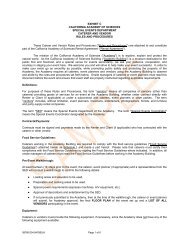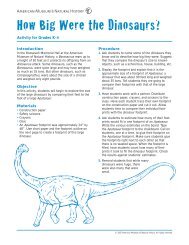Squawk of the town: Academy receives Platinum rating - California ...
Squawk of the town: Academy receives Platinum rating - California ...
Squawk of the town: Academy receives Platinum rating - California ...
You also want an ePaper? Increase the reach of your titles
YUMPU automatically turns print PDFs into web optimized ePapers that Google loves.
What were <strong>the</strong> responses to your<br />
recent Science paper (“The Coming<br />
Arctic Invasion”)?<br />
I received a few unfriendly emails and<br />
some detailed comments on my <strong>Academy</strong><br />
blog (www.calacademy.org/blogs). More<br />
than 100 posts also appeared on o<strong>the</strong>r<br />
blogs and websites. On <strong>the</strong> one hand were<br />
<strong>the</strong> skeptics, who asked why I thought<br />
<strong>the</strong> Atlantic invasion would be “harmful.”<br />
I actually never said that in <strong>the</strong> paper. On<br />
<strong>the</strong> o<strong>the</strong>r hand were those asking why I<br />
thought it would be “beneficial.” I never<br />
said that ei<strong>the</strong>r. It just shows that one<br />
should actually read <strong>the</strong> paper before<br />
commenting on it.<br />
One amusing comment I read was: “I’ll<br />
happily keep my SUV chugging if it means<br />
more shellfish on <strong>the</strong> table!”<br />
On a scale <strong>of</strong> 1-10, how certain are you<br />
that climate change is happening?<br />
Ten.<br />
How certain are you that humans are<br />
causing climate change?<br />
Ten.<br />
Roopnarine served as lead curator for <strong>the</strong> exhibit Altered State: Climate Change in <strong>California</strong>.<br />
“Climate change<br />
is <strong>the</strong> largest and<br />
most significant<br />
problem that we<br />
will face in <strong>the</strong><br />
foreseeable future.<br />
It’s something we<br />
should all care<br />
about, because we<br />
stand to lose a lot.“<br />
-Peter Roopnarine<br />
react in <strong>the</strong> future. As climate patterns<br />
change, species will ei<strong>the</strong>r die <strong>of</strong>f or<br />
move to new homes in order to survive.<br />
Predators will encounter new prey. Plants<br />
may no longer have pollinators. These are<br />
things that have happened before, so we<br />
have a model for what may happen next.<br />
When did <strong>the</strong> realization hit that you<br />
could apply your research to <strong>the</strong> current<br />
climate change crisis?<br />
In 2003, I attended a week-long<br />
conference in Japan entitled “Extinction.”<br />
It was a ga<strong>the</strong>ring <strong>of</strong> 70 scientists from<br />
many different fields: paleontologists,<br />
population ecologists, <strong>the</strong>oretical<br />
ecologists, conservation biologists. It<br />
became clear during <strong>the</strong> conference that<br />
habitat destruction and o<strong>the</strong>r activities<br />
were ope<strong>rating</strong> at a much smaller scale<br />
than climate change. Also, <strong>the</strong> media<br />
stories about that conference emphasized<br />
how critical <strong>the</strong> climate change issue<br />
was. I decided <strong>the</strong>n that I would shift<br />
<strong>the</strong> focus <strong>of</strong> my research to extinction,<br />
conservation, and climate change.<br />
How certain is <strong>the</strong> scientific community<br />
as a whole?<br />
I’d say nine and a half. The United<br />
Nations’s Intergovernmental Panel on<br />
Climate Change (IPCC) keeps track <strong>of</strong> <strong>the</strong><br />
consensus in <strong>the</strong> scientific community.<br />
Why do <strong>the</strong>re seem to be mixed messages<br />
in <strong>the</strong> popular media about climate<br />
change: whe<strong>the</strong>r it’s real or not, whe<strong>the</strong>r<br />
it’s human-induced or not?<br />
I believe <strong>the</strong>re are two reasons: 1) It’s<br />
a very difficult topic from a scientific<br />
standpoint, so <strong>the</strong>re are issues with<br />
communicating and understanding <strong>the</strong><br />
science. 2) It’s a very sensitive topic—it’s a<br />
heavy guilt trip to lay on ourselves.<br />
What can I do as an average citizen/<br />
consumer to mitigate climate change?<br />
Learn about <strong>the</strong> impact <strong>of</strong> everyday<br />
human activities and evaluate your<br />
lifestyle. Identify which one plays <strong>the</strong><br />
biggest role in your life and change it. For<br />
many Americans, this probably means<br />
transportation. The <strong>Academy</strong>’s climate<br />
change exhibit, Altered State, has a section<br />
called <strong>the</strong> “Arena for Engagement” that<br />
allows visitors to evaluate <strong>the</strong>ir lifestyles<br />
and think <strong>of</strong> alternatives.<br />
18 Winter 2008<br />
Photo: Chris Picon


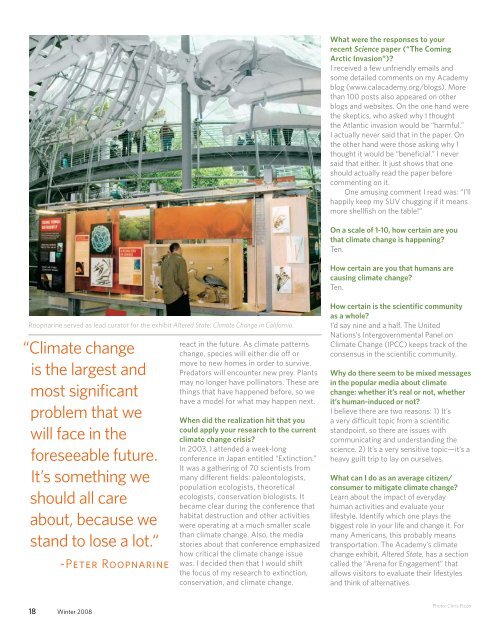
![download [PDF - 2.7mb] - California Academy of Sciences](https://img.yumpu.com/26596748/1/190x122/download-pdf-27mb-california-academy-of-sciences.jpg?quality=85)

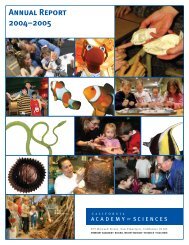

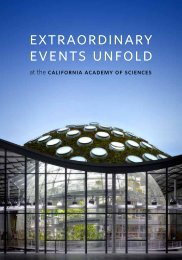

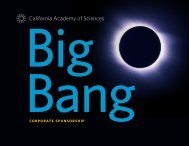
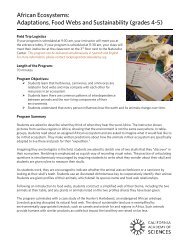
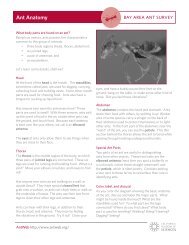
![Download a visitor map [418k] - California Academy of Sciences](https://img.yumpu.com/26596645/1/190x88/download-a-visitor-map-418k-california-academy-of-sciences.jpg?quality=85)
